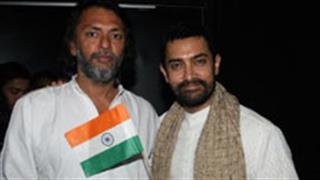If one make a list of Hindi film villains, one can write the socio-economic history of India, said popular Bollywood lyricist, poet and scriptwriter Javed Akhtar Friday at the Jaipur Literature Festival Friday.
The writer, who is active in showbiz for over four decades, said the villains in the 1950s used to be landlords; then the industrialists became the villains in the 1970s followed by the mafia dons in the 1990s.
"The hero remained a symbol of morality and aspirations. In the 1980s, the mafia don became the hero, because of people's disillusionment with law and order and the role of the state. Then politicians were made villains followed by Pakistanis," said Akhtar who himself co-scripted sagas like "Deewar" and "Shaan".
"Now, society has no villain because the villain had become the ideal. Everyone wants to be a millionaire," he added.
Akhtar was speaking at a packed session on Bollywood and National Narrative conducted by cinema expert Rachel Dwyer.
On the shortage of stories for films, he said a producer's nature of demand for a commercial film had changed. "A producer wants a brand new story that has come before!"
"(Writer) Salman Rushdie once said that every tale is a censor in itself. It stops telling of another story. In this way, you cannot make a Hindi film that represents a particular culture or region.
"So our films had names such as Mr. Ramesh and Ms. Rita. They do not have surnames. They will do 'bhangra', the heroine will wear a Maharashtrain 'mangalsutra', and do bharatanatayam.
"Hindi films have developed their own architecture. They are not rooted in a particular region or culture. An ideal Hindi film should give you all the 'masala'."
Akhtar, 68, also rued the absence of social issues in films and said it partly because of the spread of the multiplexes.
"When some friends pay Rs.500 for a film in a multiplex, they want to have party. They do not want to see Kalahandi (a poor tribal region in Odisha). It will spoil the fun. We never had so many films devoid of any social issue. I do not see another 'Mother India' or 'Pyasa' or 'Do Bigha Zameen'."
He also mocked at the lyrics of current films.
"Language is shrinking in society. How can you have good songs? Lyricists earlier used to put nature in their sings-moonlight, monsoon, and trees.
"It made romance aesthetic. That is why we still remember the songs. But all songs today are about you and me and Americanised English," he said.
'Now society has no villain because everyone wants to be a millionaire'
Friday, January 25, 2013 19:13 IST




















